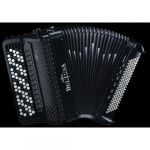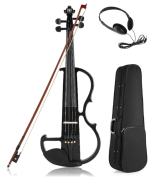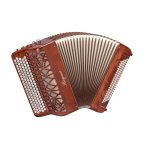You have to specify what you want the B system bass end to be: mirrored or Russian. I think people who want a convertor instrument should know which of the two they want. I doubt that the major manufacturers will make your a B-system convertor accordion without this being specified. Of course the Russians would just get you the Russian bass orientation. I don't even know whether they might be willing to get you a mirrored B system bass. (They do happily produce C-system bayans though, with mirrored C-system melody bass.)...
Of course what would be more of a deal-breaker for B system players would be the difference between rotated and mirrored B system for the left hand, with the low notes at the top like Italians would do it or the low notes at the bottom like Russians would do it.
You are using an out of date browser. It may not display this or other websites correctly.
You should upgrade or use an alternative browser.
You should upgrade or use an alternative browser.
Best Italian brands for high-end CBA converter (bayan)
Alan Sharkis
Prolific poster
Don’t forget Beltuna’s foray into using carbon fibre for shell parts and grills.They have a few noteworthy innovations: the "Amplisound" extra sound chamber you can open and close was the first I saw. Later they introduced an electromechanic bass mechanism (in the Matrix model) that eliminated the complex mechanics of a convertor accordion. Then they started adding to that, now with "half press" to allow for tone bending, and contacts on the treble side to enable playing bass notes using the keyboard, etc.
But even without any of these innovations their "basic" accordion are already very good. The Prestige Paris IV I tried years ago did not have any innovations (I'm aware of) but just had great sound and very nice mechanics too.
And solenoid control of the buttons of the left/right hands which permits 2 big advantages... a remapping of the keys/buttons to anything you can think of and identical/consistent press feel of all keys.Don’t forget Beltuna’s foray into using carbon fibre for shell parts and grills.
Huh. There is such a thing as "button articulation" which works with more than just on/off, so I am rather skeptical that the touted advantages are worth the trouble of becoming dependent on batteries. What I'd consider more of a selling point is that particularly on converter instruments (which have an abundance of reeds), you could be more flexible with registration and chord voicings. My instrument does this via mechanics, but it's clumsy enough that you would not want to change the chord octave in mid-piece.And solenoid control of the buttons of the left/right hands which permits 2 big advantages... a remapping of the keys/buttons to anything you can think of and identical/consistent press feel of all keys.
... or with a flick of a button change to ANY variation of Free Bass you can imagine. Yes it can do both. It also does things like split the keyboard with different voicings/octave choices. Without mechanical connections this is all not just a possibility, but a reality.What I'd consider more of a selling point is that particularly on converter instruments (which have an abundance of reeds), you could be more flexible with registration and chord voicings. My instrument does this via mechanics, but it's clumsy enough that you would not want to change the chord octave in mid-piece.
Well, that's fine if five people have to play the same instrument.... or with a flick of a button change to ANY variation of Free Bass you can imagine.
Organ builders are going back to mechanically linked keyboards because of a better connection with the instrument. In the age of electric and electronic keyboards, the connection with the instrument is sort of a selling point for accordion. It's sort of a headscratcher that the Bugari Evo sells because of mechanically linked pallets and Beltuna goes to selenoid activation.Yes it can do both. It also does things like split the keyboard with different voicings/octave choices. Without mechanical connections this is all not just a possibility, but a reality.
96Bass
Well-known member
Beltuna Paris Prestige IV (C griff)
4000 Euros

 www.quoka.de
www.quoka.de
19500 Euros

 www.kuantokusta.pt
www.kuantokusta.pt
4000 Euros

Akkordeon Converter C-Griff, Beltuna Paris Prestige
Akkordeon Converter C-Griff, Beltuna Paris Prestige. NEUWERTIG es Profi-Instrument. Zweitinstrument und nur Zuhause bespielt. Mit Rollkoffer. Diskant: 4-chörig / 11 Register + 5 Kinnregister / Monitor-Wholes / 58 Töne ( g-e ) Bass: 6-chörig / 6 Register / 120 Standard-Bass Converter...
19500 Euros

Beltuna Prestige IV K Paris Acordeão Convertor
Compara os preços deste produto em 0 lojas e começa já a poupar.
96Bass
Well-known member
... or you have a configuration not as popular (ie: Moschino) or want to design a new system or want to try out different systems to see which is best for you or you want to setup a custom range for a song that you wrote... lots of reasons. I use the split keyboard on the 8x and literally set the first top 8 keys to percussion sounds and the rest to regular accordion. Lots of fun!Well, that's fine if five people have to play the same instrument.
It's not completely new, this is a few years that they have this out now. Also its not so much about the solenoids as much as it is about there being ANY new advancements on the accordion in many a decade, and that is very exciting!Organ builders are going back to mechanically linked keyboards because of a better connection with the instrument. In the age of electric and electronic keyboards, the connection with the instrument is sort of a selling point for accordion. It's sort of a headscratcher that the Bugari Evo sells because of mechanically linked pallets and Beltuna goes to selenoid activation.
My first instrument is a violin. There's not been relevant advancements in centuries, except that there are stages in their production where machining can significantly reduce the workload, to the degree where trash violins can be produced for peanuts. A century ago, there was no point in producing violins below a certain quality level because so much manual work had to go into them anyway.It's not completely new, this is a few years that they have this out now. Also its not so much about the solenoids as much as it is about there being ANY new advancements on the accordion in many a decade, and that is very exciting!
Electric linkages are sort of a shortcut. They definitely are great for prototyping. And they will make MIDI communication (for record and play) a breeze to implement. But they are threading a very thin line to actual digital sound production. Other instruments like "silent" pianos are having a very tricky time positioning themselves against purely electronic solutions, and the way they manage is by providing one completely mechanical way of doing things. With regard to evolving music, there is a trend towards use of the free bass instead of Stradella. But that's not what bread-and-butter instruments are about. Converters are still elitist instruments.
So I'm fuzzy about just what advancements will make a difference to the impact of the instrument. Maybe anything that can take a few pounds off the weight without resulting in inferior sound quality. That was already part of the point of the Hohner aluminum revolution (Atlantic, Imperator and similar).
There's been experiments with mechanical sound processing beyond just cassotto ("Amplisound", the Russian "Timbre" ensemble and their instruments) but they haven't really led to any new demand in must-have stuff. The market is pretty traditional.
I know nothing about violins, but even I know there have been a few tech advancements... how about an electronic wireless violins?My first instrument is a violin. There's not been relevant advancements in centuries,

Yes there are MIDI violins here too as are midi guitars, etc.... But this is comparing apples to oranges, right? So that's not my point though.
Electric accordions are part of the evolution (Cordavox, Elkavox, Hohnervox, etc...), digital accordions are part of the evolution (V-accordions, Musictech, etc...). Using new compounds like carbon fiber, solenoid switches is indeed part of the evolutionary history of the accordion now too, kind of hard to deny that.
Does that mean that acoustic boxes are going to disappear? Of course not. The "new wave" of technology is also not for everyone, nor is it expected to be... but as long as humans and their need to innovate, advance and yes, make money off of exist, these kinds of changes are going to slowly continue, which sometimes are not a bad thing (I feel the accordion world would be in a worse place with fewer new users without Roland doing what they did). Finally, there are going to be people like me that may love the old original designs but also enjoy seeing those advances and are often open to voting with our wallets when we approve of a direction.
You say that you are fuzzy about what technology does "for us"... just speak to someone other than me that owns a V-accordion, ask them why they voted with their wallets... that will partially be your answer (it will be different for near everyone whom you ask), about what this tech does for us as accordionists.
The seminal word here is "relevant".
Evolution has lots of dead branches.Electric accordions are part of the evolution (Cordavox, Elkavox, Hohnervox, etc...), digital accordions are part of the evolution (V-accordions, Musictech, etc...). Using new compounds like carbon fiber, solenoid switches is indeed part of the evolutionary history of the accordion now too, kind of hard to deny that.
Just curious: do you know anyone who would not have started (or continued) with accordion without Roland being in town?Does that mean that acoustic boxes are going to disappear? Of course not. The "new wave" of technology is also not for everyone, nor is it expected to be... but as long as humans and their need to innovate, advance and yes, make money off of exist, these kinds of changes are going to slowly continue, which sometimes are not a bad thing (I feel the accordion world would be in a worse place with fewer new users without Roland doing what they did).
I do consider it likely that there are several who depended on Roland for experimenting with CBA or with converters. That goes into the direction of "prototyping", experimenting. I also consider it likely that there are several who use them in band contexts, but pretty much exclusively with accordion sounds. I just have a hard time imagining that they are what causes people to start with accordion.
No, for the lasting advancement of the instrument. My instrument is vintage 1960. It has not become obsolete due to organ accordions or MIDI accordions or digital accordions.Finally, there are going to be people like me that may love the old original designs but also enjoy seeing those advances and are often open to voting with our wallets when we approve of a direction.
You say that you are fuzzy about what technology does "for us"...
Because they are fun to people who already know how to play the accordion. Maybe it's an entry price question? Electronic keyboards start dead cheap. Admittedly, many people starting on cheap toys don't get hooked for long.just speak to someone other than me that owns a V-accordion, ask them why they voted with their wallets... that will partially be your answer (it will be different for near everyone whom you ask), about what this tech does for us as accordionists.
You are missing a couple of words... "TO YOU" because evidently more than one person has bought an electronic violin but apparently, their opinion doesn't matter. Likely the same for any other accordion advanced or not, good or not... other than an acoustic box.The seminal word here is "relevant".
OK, here is what I shall do. I see that we both have very strong opinions. I will not pursue this thread and merely say that we can agree to disagree.
Have a nice evening/day.
So where are the compositions calling specifically for electric violin? The composers writing for it? The method books? The musical college courses and job offerings for teachers? Legendary performers and brands? Bands, combos, ensembles specifically looking for them? No shortage for electric guitar in that respect.You are missing a couple of words... "TO YOU" because evidently more than one person has bought an electronic violin but apparently, their opinion doesn't matter.
Well, since this is an accordion forum, no one here really will care, will they? Feel free to ask that on a violin forum, I am sure they would be happy to share their reasons with youSo where are the compositions calling specifically for electric violin? The composers writing for it? The method books? The musical college courses and job offerings for teachers? Legendary performers and brands? Bands, combos, ensembles specifically looking for them? No shortage for electric guitar in that respect.
.
So where are compositions for digital accordions you may ask? My retort is that the digital accordion has groups such as the all digital accordion orchestra from New England doing their thing quite successfully, and there is the obvious answer that it can be quite successfully used with all music that is used with/for accordions today.
Now why an evolutionary accordion with carbon fiber parts or solenoid actuators could not be used for anything written for accordion, I am fairly certain there is no valid reason why it could not.
Good luck tone-bending with solenoid actuators. And the question was about what new paths will be opened and actually be frequented by technology.Now why an evolutionary accordion with carbon fiber parts or solenoid actuators could not be used for anything written for accordion, I am fairly certain there is no valid reason why it could not.
Yes, like in 50 years of playing accordion, I actually ever found a need for this. Seriously, this conversation is getting ridiculous. I'm done with this discussion.Good luck tone-bending with solenoid actuators. And the question was about what new paths will be opened and actually be frequented by technology.
I see the newest software even gives you Kravtsov free bass. Sadly that doesn't help many people as there is no Kravtsov treble side layout available... And I don't know anyone who plays Kravtsov left hand without having Kravtsov on the right hand...... or with a flick of a button change to ANY variation of Free Bass you can imagine. Yes it can do both. It also does things like split the keyboard with different voicings/octave choices. Without mechanical connections this is all not just a possibility, but a reality.
I wasn't the one making statements about "anything written for accordion". If you want to constrain your statements to your own definitely extensive uses of the instrument rather than vying to speak for everyone, they will be less controversial.Yes, like in 50 years of playing accordion, I actually ever found a need for this. Seriously, this conversation is getting ridiculous. I'm done with this discussion.
And it won't help people used to playing Belgian bass either. But they are a dying species I think. There is a point in consolidation. The sad thing is that the most definite want I have seen for being able to change systems on the fly is on accordion conventions when people want to try out other people's instruments. And there is not much of a point in it if all the instruments sound the same because of the same sound patches inside.I see the newest software even gives you Kravtsov free bass. Sadly that doesn't help many people as there is no Kravtsov treble side layout available... And I don't know anyone who plays Kravtsov left hand without having Kravtsov on the right hand...
And people will be very loath to let other people mess with permanent settings they never use and don't know how to change (if they are even documented: I once managed switching my FR-1b into piano accordion mode which was not a good thing). Who will have thought of making a full backup before going to a convention? Mechanical accordions are easy to bring back into expectations.
So the practice tends to look less great than the theoretical outlook.
Last edited:
Similar threads
- Replies
- 34
- Views
- 882
- Replies
- 10
- Views
- 488
- Replies
- 71
- Views
- 3,034
- Replies
- 55
- Views
- 1,826
- Replies
- 13
- Views
- 524

